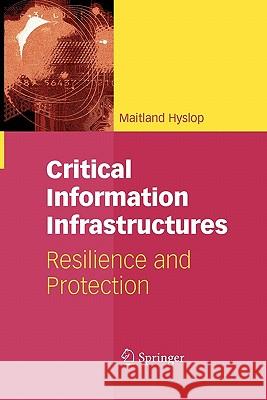Critical Information Infrastructures: Resilience and Protection » książka
Critical Information Infrastructures: Resilience and Protection
ISBN-13: 9781441944191 / Angielski / Miękka / 2010 / 278 str.
Resilience is an increasingly important concept and quality in today s world. It is particularly important in the area of Critical Infrastructures. It is crucial in the area of Critical Information Infrastructure. This is because, since the year 2000, man has been dependent on information and telecommunications systems for survival, particularly in the Organization for Economic Cooperation and Development (OECD) countries, and because all other Critical Inf- structures depend upon, to a greater or lesser extent, Critical Information 1,2 Infrastructure. Until, probably, the late 1980s it would be fair to say that the defense of individual nation states depended upon a mixture of political will and armed might. The fall of the Berlin Wall may have effectively ended the Cold War, and with it a bipolar world, but it brought globalization and a multipolar digital world in its wake. Simply put, a number of power vacuums were created and these have yet to be fully filled and settled. In this New World many changes were afoot. These changes include the increasing irrelevance of nation states in federated structures and the export of democracy on the back of globalization. One of the biggest changes, though, is the use of digital technolo gy by the OECD countries. This is on such a scale that these countries have become both dependent upon information technology and as individual 3 states largely irrelevant to the new global electronic economy. 1 This adaptation of Maslow s hierarchy of needs is attributed to KPMG."











